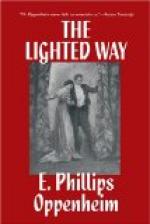“Might I ask,” Arnold said, “if you knew this man—if you had ever come into contact with him or seen him before?”
“Certainly not,” Mr. Weatherley replied. “What business could I possibly have with a person of that description? He seems to have been, if not an habitual criminal himself, at least an associate of criminals, and he was without doubt a foreigner. Between you and me, Chetwode, I haven’t the least doubt that the fellow was one of a gang of the worst class of burglars. Wherever he got that blow from, it was probably no more than he deserved.”
“But, Mr. Weatherley,” Arnold protested, “don’t you think that you ought to have an investigation among your household?”
“My dear young fellow,” Mr. Weatherley answered, testily, “I keep no men-servants at all except old Groves, who’s as meek-spirited as a baby, and a footman whom my wife has just engaged, and who was out for the evening. A blow such as the paper describes was certainly never struck by a woman, and there was just as certainly no other man in my house. There is nothing to inquire about. As a matter of fact, I am not curious. The man is dead and there’s an end of it.”
“You will bear in mind, sir,” Arnold said, “that if it comes to light afterwards, as it very probably may, that the man was first discovered in Mrs. Weatherley’s boudoir, the scandal and gossip will be a great deal worse than if you came forward and told the whole truth now.”
“I take my risk of that,” Mr. Weatherley replied, coolly. “There isn’t a soul except Groves who saw him, and Groves is my man. Now be so good as to get on with those letters, Chetwode, and consider the incident closed.”
Arnold withdrew to his typewriter and commenced his task. The day had commenced with a new surprise to him. The nervous, shattered Mr. Weatherley of yesterday was gone. After a happening in his house which might well have had a serious effect upon him, he seemed not only unmoved but absolutely restored to cheerfulness. He was reading the paper for himself now, and the room was rapidly becoming full of tobacco smoke. Arnold spelled out his letters one by one until the last was finished. Then he took them over to his employer to sign. One by one Mr. Weatherley read them through, made an alteration here and there, then signed them with his large, sprawling hand. Just as he had finished the last, the telephone by his side rang. He took the receiver and placed it to his ear. Arnold waited until he had finished. Mr. Weatherley himself said little. He seemed to be listening. Towards the end, he nodded slightly.
“Yes, I quite understand,” he said, “quite. That was entirely my own opinion. No case at all, you say? Good!”
He replaced the receiver and leaned back in his chair. For the first time, when he spoke his voice was a little hoarse.
“Chetwode,” he said, “ring up my house—16, Post Office, Hampstead. Ask Groves to tell his mistress that I thought she might be interested to hear that Mr. Starling will be discharged this morning. The police are abandoning the case against him, at present, for lack of evidence.”




